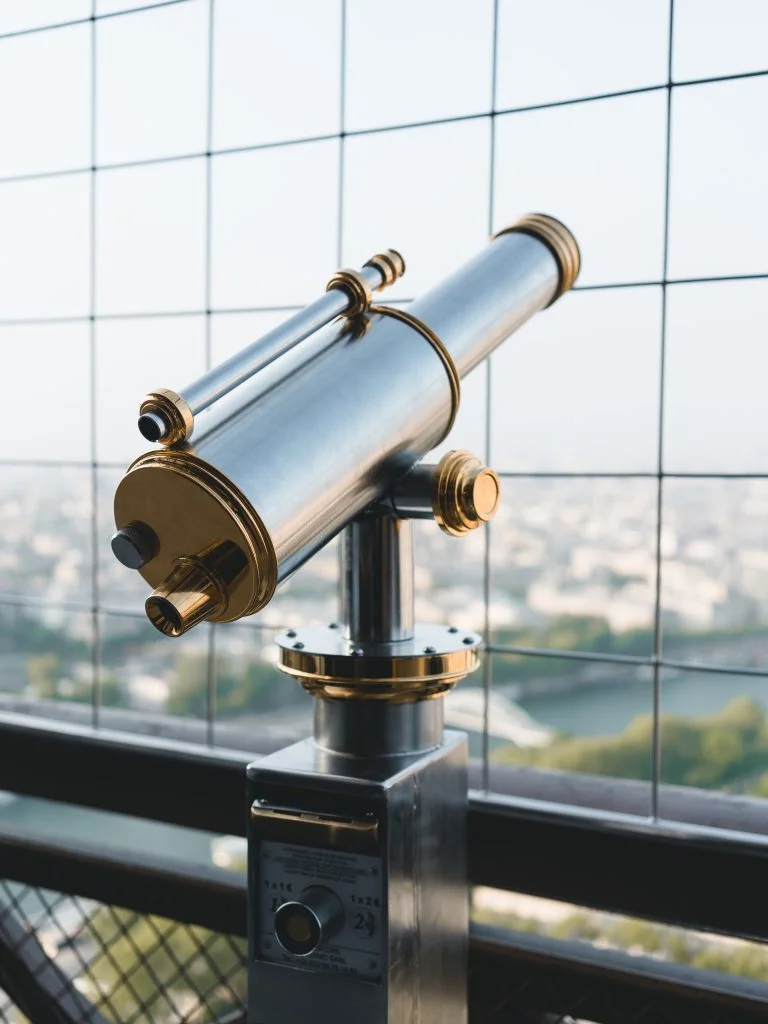Have you ever set up a telescope, hoping for a cosmic revelation, only to realize you’ve forgotten to remove the lens cap? Guilty as charged! I’m your fellow space enthusiast who once mistook a bright star for a UFO (turned out to be Venus, but we won’t talk about that).
Telescopes and I have shared many laugh-out-loud moments. And guess what? I’ve gathered 50 fascinating facts about them. Ready to embark on this interstellar journey filled with fun facts and the occasional embarrassing story?
The purpose of the telescope is not to present an image of an object, but to collect light from it.
Annie Jump Cannon
Telescope Facts
Let’s zoom into all these magnificent facts. But remember. Every detail counts because, as always, I created a quiz at the bottom of this page to test if you are a good reader or not. Don’t disappoint me.
- Galileo Galilei didn’t invent the telescope; instead, he enhanced a pre-existing model in 1609.
- The term “telescope” originates from Greek words: tele, signifying “distant”, and skopos, meaning “observer”.
- Launched in 1990, the Hubble Space Telescope circles our planet, delivering exceptionally detailed cosmic images.
- Radio telescopes are specialized to perceive radio waves emitted by cosmic entities, not visible light.
- The Gran Telescopio Canarias, situated in Spain, is the globe’s most substantial optical telescope, boasting a 10.4-meter mirror diameter.
- Telescopes differ based on the radiation types they perceive, such as optical, radio, infrared, ultraviolet, X-ray, and gamma-ray.
- Designed to succeed the Hubble, the James Webb Space Telescope aims to scrutinize the cosmos in infrared.
- Larger apertures in telescopes gather more light, allowing the observation of more obscure celestial bodies.
- Chile’s Very Large Telescope comprises four individual telescopes, collaboratively observing remote celestial objects.
- Telescopes utilize lenses for refraction or mirrors for reflection in their optical structures.
- The largest global radio telescope is China’s FAST (Five hundred meter Aperture Spherical Telescope).
- The main functionality of telescopes is the magnification of light, surpassing the human eye’s capabilities.
- Modern telescopes utilize adaptive optics to rectify distortions originating from Earth’s atmospheric conditions.

- The Keck Observatory in Hawaii employs 36 hexagonal mirror segments in unison, mimicking a singular unit.
- Space telescopes, positioned beyond our atmosphere, achieve clearer celestial observations by avoiding atmospheric obstructions.
- Telescopes are typically stationed at elevated altitudes to minimize atmospheric disturbance in celestial observations.
- In 2019, the Event Horizon Telescope captured the inaugural image of a black hole’s silhouette.
- Telescopes have been instrumental in validating the continuous expansion of the universe.
- Thomas Harriot made the inaugural telescopic recording of the Moon in 1609.
- The Spitzer Space Telescope, which specialized in infrared observations, concluded its mission in 2020 after 16 remarkable years.
- Earth-based telescopes are frequently positioned at elevated altitudes to minimize atmospheric interference during astronomical observations.
- Interferometry involves multiple telescopes collaborating to simulate a more substantial, unified telescope.
- Telescopes have witnessed gravitational lensing, a concept foreseen by Einstein, supporting general relativity’s principles.
- The Spitzer Space Telescope, an infrared observatory, concluded its mission in 2020 after 16 operational years.
- Astronomy, the exploration of celestial entities, predominantly depends on telescopes for investigative research.
- Modern observatories predominantly employ digital detectors, superseding traditional film for image capturing.
- Telescopes have been indispensable in discovering exoplanets, planets located outside our solar system.
- A telescope’s resolution defines its capability to unveil detailed aspects of remote celestial bodies.
- One of the considerable challenges in crafting sizable telescopes is managing the deformation of the mirrors.

- Telescopes have elucidated our understanding of stars‘ life cycles, including the realization of neutron stars and black holes.
- Dobsonian telescopes are popular among amateur astronomers due to their affordability and straightforward design.
- The Chandra X-ray Observatory specializes in detecting X-ray radiations from the universe’s high-temperature zones.
- Telescopes have contributed to estimating the universe’s age at roughly 13.8 billion years.
- Telescopes have facilitated the observation of supernovae, marking the catastrophic end of massive stars.
- The speed of light delineates telescopes’ observational limits, enabling views up to 380,000 years post-Big Bang.
- Ancient civilizations, pre-telescope, used naked-eye observations, resulting in planets like Venus and Mars being discovered.
- Spectroscopy, which studies light’s interaction with matter, frequently employs telescopes.
- Many telescopes feature altazimuth mounting, enabling multi-directional swiveling and celestial object tracking as Earth revolves.
- The TMT (Thirty Meter Telescope) project aspires to integrate a 30-meter primary mirror.
- Telescopic observations have affirmed the presence of dark matter and dark energy in cosmic realms.

- Telescopes have enhanced our comprehension of galaxy genesis and progressive evolution.
- Not exactly telescopes, the Voyager spacecraft relayed comprehensive planetary images during their exploratory journeys.
- Space telescopes require thermal regulation to proficiently observe infrared without the instrument’s thermal interference.
- Mount Palomar Observatory in California dominated as the preeminent telescope for substantial parts of the 20th century.
- Telescopic discoveries include asteroids and comets, some exhibiting proximity to our planet.
- The Planck satellite, an astronomical telescope, yielded meticulous imagery of cosmic microwave background radiation.
- Ultraviolet telescopes scrutinize stars and galaxies, offering insight into their thermal and chemical attributes.
- Optical telescopes, the prevalent variety, correspond with the conventional notion of telescopes.
- The Mauna Kea Observatory in Hawaii is among the planet’s foremost observation points.
- Astronomical filters in telescopes enhance contrast by limiting the light spectrum entering the telescope.
Telescope Myths

I remember a friend telling me that with his home telescope, we could see a super-close shot of the moon. His telescope was a cheap one, under $20, so it was an easy myth to bust. Let’s see some more important ones.
- Bigger Telescopes Always Mean Better Views.
Bigger telescopes can capture more light, but the clarity of what you see also depends on things like the telescope’s lens quality, the weather, and how used to stargazing you are. Believe it or not, a compact, top-notch telescope might show you a clearer sky than a massive but mediocre one. - Telescopes Can Only Be Used At Night.
Did you know? Telescopes aren’t just for night. During the day, they can help us check out the sun (make sure you have the right solar filters!), planets, and the moon. Craftsmen design solar telescopes especially to observe our sun. - Telescopes Allow You To See Colors in Deep Space Objects.
We can observe some colors in bright objects like planets, but many deep-space objects look gray or greenish when we view them with the naked eye through a telescope. True colors often require long-exposure astrophotography. - Expensive Telescopes Will Show Images Like Those in Magazines.
Magazines often use long exposures to capture vibrant, detailed images of space, and they frequently enhance or combine them with data from multiple sources. While a good telescope can show incredible details, real-time views won’t match these processed images. - Observing Space from the City is Impossible Due to Light Pollution.
City lights might dim the glow of distant stars and far-off space wonders, but with a telescope in hand, you can still spot planets, the moon, and some of the brighter stars even in the city.
No products found.
Telescope FAQ

Do you know who invented the telescope? If not, take a look at the most-asked questions online about telescopes. If yes, still do it because the next section is the quiz section.
- Who invented the telescope first?
Hans Lippershey, a Dutch guy, gets the credit. There were others, but he’s the main man. - How does the telescope work?
It’s like a super-eye! Grabs more light, uses lenses or mirrors to focus it, and bam—distant stuff looks closer and clearer. - What are the uses of a telescope?
Stargazing, for sure! But also spying (not the creepy kind, think military), birdwatching, and helping sailors at sea. - What is a radio telescope?
It’s a big dish that “listens” to space radio waves. It doesn’t “see” like regular telescopes but “hears” the universe. - How does a telescope lens work?
Bends light. There are two main lenses: a big one to gather light and a smaller one to magnify what the big one finds.
Trivia About Telescopes

Once again, it’s time to test how good of a reader you are. If you fail to answer any of the questions correctly, I’ll assume that you are using the wrong end to look through.
Conclusion
As we telescope out of this article (pun absolutely intended), let’s take a moment to appreciate the wonderful contraption that lets us snoop on distant stars and planets. It’s almost like the universe’s version of neighborhood-watching, right?
Quick question for you: Ever tried using your telescope to spy on Mars and accidentally caught your neighbor’s BBQ party instead? Just me? Oh, well. Keep looking up and laughing down.


